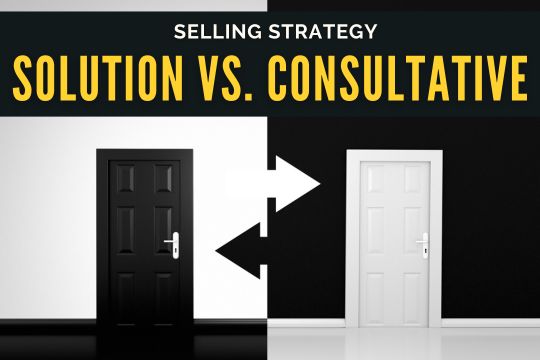
Sales strategies can be overwhelming and unfamiliar to any business. Two methods that can greatly impact how your business grows and thrives are solution selling and consultative selling. Each method benefits businesses and the one you choose can help your business with long-term success.
Approach:
Focus:

Solution selling is a sales method deeply entrenched in a structured sales process designed to guide prospects through a predetermined path toward product acquisition. This methodical approach typically involves a series of distinct steps meticulously orchestrated to lead the client from initial contact to final purchase.
The journey begins with identifying potential leads, where sales professionals leverage various strategies to identify and qualify prospects who may need the offered product or service. Once qualified leads are identified, the next step involves compellingly presenting the product or service, highlighting its features, benefits, and value proposition. This presentation phase aims to demonstrate how the product can directly address the client's specific pain points or challenges, positioning it as a viable solution.
As the sales process unfolds, solution sellers anticipate and address potential objections raised by the client, employing persuasive techniques and providing reassurance to overcome any hesitations or reservations. This phase requires a keen understanding of the client's concerns and objections beforehand and effective communication skills to navigate potential roadblocks and objections successfully.

Ultimately, the culmination of the solution-selling process lies in closing the sale, where sales professionals utilize various closing techniques to secure a commitment from the client and finalize the transaction. This final step often involves negotiation, pricing discussions, and agreement on terms and conditions, culminating in the client's successful acquisition of the product or service.
In stark contrast to the structured approach of solution selling, consultative selling thrives on fostering meaningful dialogues and nurturing long-term client relationships. At its core, consultative selling is not merely about selling a product but providing valuable insights, guidance, and solutions that genuinely benefit the client's business.
The important concept of active listening is central to the consultative selling approach, where sales professionals attentively listen to the client's needs, concerns, and aspirations without interruption or preconceived notions. By truly understanding the client's unique challenges and objectives, sales professionals can ask probing questions to uncover deeper insights and gain a comprehensive understanding of the client's business environment.
This understanding allows consultative sellers to collaborate with clients to co-create tailored solutions that address their specific needs and objectives. This collaborative approach involves engaging in open-ended inquiries, encouraging clients to articulate their goals and preferences freely, and providing expert guidance and advice based on a thorough analysis of the client's requirements.
Moreover, consultative selling prioritizes establishing long-term relationships built on trust, integrity, and mutual respect. Relationship building is also one of the top sales tips to close business with consultative selling. By serving as trusted advisors when considering solution selling vs consultative selling, consultative sellers aim to become valued partners who contribute to the client's success over the long term.
How you establish connections and secure deals is pivotal to your success. Recognizing the differences between solution selling and consultative selling holds profound significance for the following reasons:
Seizing Opportunities for Business Growth
Regardless of which selling method you decide to use, it should be something that your sales team and clients benefit from as a whole. If you are interested in SEO for small business websites, visit our website today for more information about attracting customers to your unique business.
Solution selling starts with a predefined product or service and positions it as the fix for a known problem, while consultative selling first explores the client's situation, then designs a tailored recommendation.
Choose solution selling when the client already recognizes a specific need that your ready made offering solves and speed, clarity and efficient demonstrations matter more than deep discovery conversations.
Consultative sellers listen actively, ask open ended questions, diagnose root causes, and co create answers. This collaborative process shows genuine care, builds trust, and positions the salesperson as a long term advisor.
Essential skills include active listening, curiosity for probing questions, analytical thinking to map pain points to options, communication that translates insights into value, and patience to guide lengthy discussions toward mutually beneficial solutions.
Yes, many teams begin with exploratory consultative conversations to uncover needs, then shift into solution selling mode once requirements are clear, using structured presentations, demonstrations and closing techniques to finalize the deal.